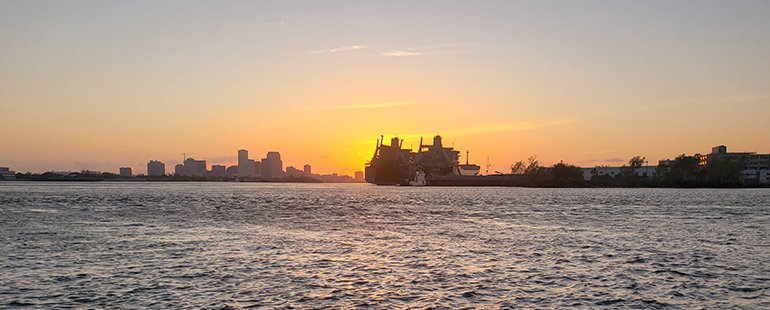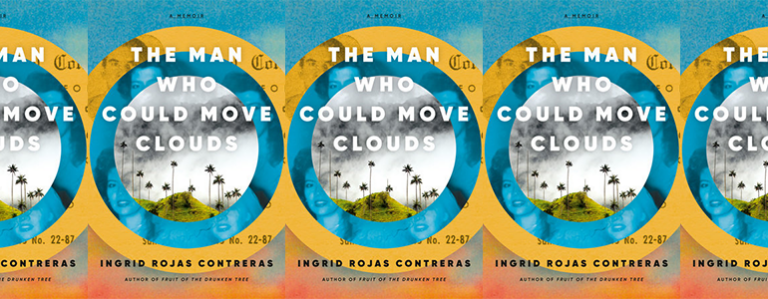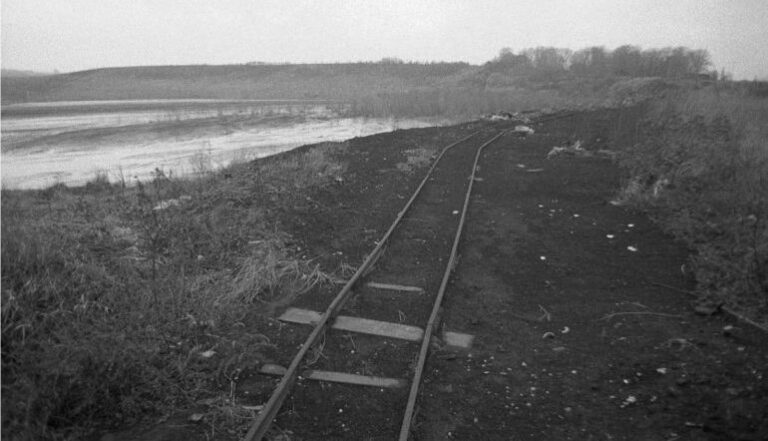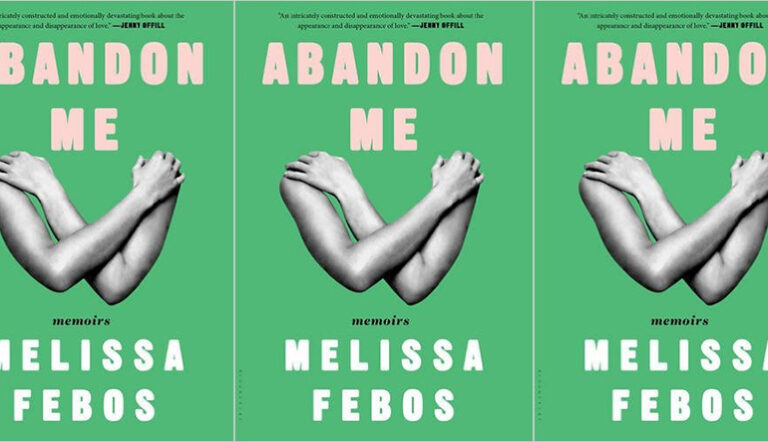Reading City Without People: The Katrina Poems in an Isolated New Orleans

Niyi Osundare has a line in his 2011 book City Without People: The Katrina Poems that goes, “Enia lasoo mi,” which translates from Yoruba to English as, “People are my clothes.”
I had marked March 17 as a day to celebrate. That day marked the end of a long stretch of time when I had been busy bartending and surviving Mardi Gras, then reading at two different literary festivals in two different states, then turning my thesis in. I wanted to have a ceremonial rum on the levee, then celebrate with my peoples. But as isolation recommendations regarding COVID-19 grew more widespread, I knew this wasn’t going to happen. Bars closed, many of my peoples isolated in different places, and we all needed to shelter in place. So, when I woke up on the seventeenth, I had that line from Osundare’s book in my mind. I needed to read City Without People again.
That desire was one of those cravings you get, where you want to read and live in the rhythm of a world put on paper. I couldn’t find my copy, and I had to do errands, so when a second-hand bookstore said they were still open and had some copies left, I decided I’d pick one up.
When I left home, there was no one around. The weekend before, New Orleans had made national news for people disobeying the mayor and having block parties, and for people still going out to Bourbon Street. The bar I worked at, a popular one on one of the busier music streets in the city, decided to close down. Others followed suit. The town had been emptied. “People are my clothes.” New Orleans is nothing without its people. And in the middle of a pandemic, the city looks naked of what brought me here, what has kept me here time and time again.
In my car, I opened up my book. “Roads lost their names, streets their memories.” Was this really my adopted city? The one known for the music on the corners of the streets, the one that reminded my father of his native La Habana every time he came here. Had it really been emptied of all the people I love? Maybe I just needed to hear from a familiar voice, Osundare, a poet I look up to, a friend I admire, a professor I’ve learned from, a mentor I’ve been under the tutelage of.
Driving home, I thought of all the Mardi Gras parades that weaved down these streets. I thought of my sister jumping up and down and asking to be thrown something from the floats. I thought of how I spent my Mardi Gras just a few blocks down the street, at Congo Square, where enslaved Africans held spiritual practices, where they drummed and danced. I thought of how I know people who meet and drum there now. I thought of catching the Skull and Bones in Treme, the bonemen shouting their calls, bellowing, “You better straighten up, before you come see us.” I thought of walking with loves through those streets and the square to get coffee in the French Quarter. I thought of second lines and jazz funerals that cut through all these neighborhoods and farther out, for those I’ve lost, for those our city has lost. I thought of all of this, with the town all quiet, no one around except those who are masked in different ways than they were weeks ago. I wonder if Mardi Gras spread COVID-19. I wonder if all the love spread it. I wonder if these were really the same roads of Mardi Gras. Were these really the roads I loved to be on? Will these ever be the same roads I love again?
Osundare is a Nigerian author who is known for his political poetry. He has lived in New Orleans for decades, teaching at the University of New Orleans, and he has been published all over the world. City Without People is a book of poems written about his experience surviving the Federal Floods in 2005, hiding out in his attic before escaping with his partner with the help of a neighbor. The book also talks about his journey away from and back to the New Orleans he loves. About the changing tides of isolation, and how he and his family were helped and hurt by strangers and friends along the way, before his return to the hollowed-out home of New Orleans that slowly regained itself bit by bit.
When I got home, I went out to my balcony and opened City Without People. I sipped some tea while smoking a cigarillo. I read the lines, “What do you call a city / Without people?” Osundare’s poetry working off the oral histories. Working off the conversational tones.
Across the street from me are some basketball courts. I hear the echo of the solitary basketball player shooting by himself. A week ago, I’d limp down there and shoot around with him. A week ago, there’d already have been a game going and I’d have to call “Next.” Now, I don’t know when the next “Next” will be.
I decided to celebrate alone. I walked to the levee in front of my old house, the house I lived in when I first returned to town. I sat on my favorite rock that juts over the beach, not paying attention to the few strangers around me. I read Osundare’s words. I heard the line, “water has memory / its mouth sizzles with vengeful teeth.” I can see the canal bleed into the Mississippi River, how the river will eventually bleed into the gulf. I think of the history, how many things have been up and down this river. I see snapshots of good and bad moments of history, of the macro and my own, that all took place in front of this river that witnessed it all.
I wonder if they will tell us in a few days to not be by the water. That the river carries a virus now. I wonder if there will be a snapshot of us, of those who were last seen on the levee, before we unceremoniously died. I wonder if the water will remember this, like I will.
I read on the levee, as the tea bled into rum. “What storms took away, friendships will restore.” I thought of all my friends who were not up on the levee with me. No rum being passed, no hugs shared. I sat alone on my rock and looked at the river.
I inventory the strangers around me. I see a man yell at a dog for running close to me, and I see strangers sprinkled on the grass at different distances and patterns. I see a man on the rocks, talking on his earphones, speaking what I think may be Yoruba. I wonder what he would say about the poems. If we would have been friends in a world where I could have approached him, if we could still be friends later in life. I wonder if we would share a rum or a hug on the levee. I wonder if we will ever return to a world like that.
I think of all the people triggered by the National Guard setting up camps in town, about my bartender and musician friends who became jobless overnight, about those who are struggling in ways worse than I am.
I think of the person who Osundare writes about, offering a blanket statement of help. Of how I have offered to help people, but what can I actually do? I don’t want people to feel alone, but I don’t know how to help in isolation. Maybe helping is staying inside. But how do you stay inside when all you see are hands sticking out of the water?
I think of Osundare’s poem that speaks from the perspective of a parent. It goes: “I would do anything, son / To make sure your days on earth / Are longer than mine.” I think of my mother and father back home in Miami. Of how they tell me to stay in New Orleans for fear of infecting them, for fear that one of us unknowingly has it and can hurt the others. I wonder if they are just trying to keep me safe. Or am I suffering from a hero complex over here? I wonder if both my father and I are suffering from a hero complex of seeing a hand up in the water, and trying to save the other, only for both to drown. I wonder if one of us is drowning, or which one of us is drowning.
Osundare writes how “Katrina won’t get the last word.” He ends with poems that turn street names of New Orleans into poetry. In the preface to the book, he writes, “These poems insist on breaking the silence precipitated by the combined forces of anonymity and invisibility which often stand between the needy cry and the listening world.” Osundare was a witness, and he gives voice to the good and the bad, the love and the loss of his homecoming, to those who care to listen.
The sun set. It is dark and I’m all alone besides a solitary couple to my right. I read in the last of the light, “And levees which toy with / The murderous fury of raging waters.”
I write this piece because we will survive. I write this piece cause I hear all of my peoples struggling more than me. I write this for the friends and elders I and this city just lost, for I can hear and feel their secondlines in my head, even though I know we can’t take over the streets just yet. I write this piece cause I hear Osundare’s laugh. I hear his cadence as he teaches me, reminding me of mis abuelos, both the one that has passed and the one that lives with us, whose voices I still hear and need. I write this piece cause of the Skull and Bones, the bonemen warning us about death next year during Mardi Gras, living to tell us that tale again. I write this piece cause of coffees with sweethearts on walks through the quarter. I write this piece cause I see the sun rising over the levee soon, and all my loves and all the strangers too, sitting there, loving on each other sharing hugs and rums. I write this cause I can hear my voice saying these words, and I can hear my friends asking for the rum to be passed, and I can damn near taste that first day where we all celebrate surviving this. And hearing those words and seeing those words keep me content in isolation, stave off the pain and fear, until the next time we can all grace the levee and each other, and add our voices to each other, and squeeze each other in front of the water that has nothing but memory, as we clothe ourselves in the love of our peoples. For there is no such thing as a city or love without our peoples, and we will be back again, and I know, and I hope, and I know, that it will taste even better than we remember.


